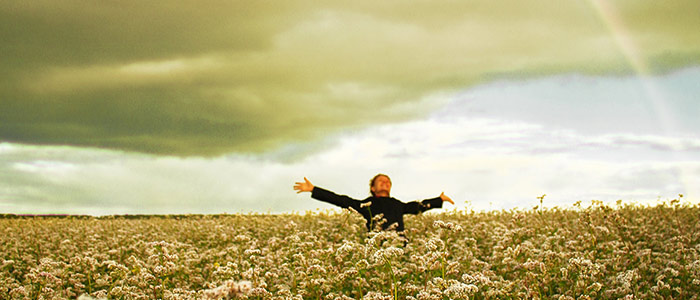True Happiness is Not Experiential
We commonly use the term happiness, ānanda, to express our pleasurable experiences. There are other words that we tend to use quite interchangeably such as fulfillment, bliss, joy, well-being and so forth. These allied terms may be used to express different degrees or levels of happiness experienced both in the secular and sacred realms. One may reason that there is a difference between the relative pleasure experienced while eating ice cream and savoring the absolute joy of the fullness of our being. While pleasure born of eating ice cream is experiential, savoring the joy of our being, our conscious presence, is more a matter of recognition of our true nature, svarūpa, than gaining any new experience.
This pursuit of seeking greater/higher degrees of happiness keeps us committed to a life of endless becoming or being on the treadmill of perennial pleasure-trips. Regardless whether it is some new toys trip; better relationship trip, new car, new house, new gadgets trip; or money, name and fame trip; or taking a world tour or going on an extended vacation or cruise. One thing remains unchanged in all these pursuits: relentless hankering for the next best pleasurable experience. This seeking-mindset could be common in both the secular as well as the sacred realms. Whether we are seeking some tangible sensuous pleasure or some mysterious spiritual bliss, we may still be belaboring on the Ferris Wheel of Becoming.
Since things, experiences can be infinitely improvable one never really feels fully content with what one has and always pines for more or something else. The Nature also plays its dual-trick on our psyche through proffering its proverbial ‘grass is greener on the other side’ illusion while at the same time dooming our senses with the ennui of repetition. Much to our dismay, we soon discover that the grass is not really any greener on the other side after all; and even if the grass were a bit greener on the other side, the relative familiarity quickly dulls the edge of our appreciation. And we soon find ourselves back to square one—looking for some greener grass on the other side of yet another fence!
This inveterate habit of the mind always wanting more, pining for the next best, better thing, is called saṅsāra, the cycle of becoming. No matter what or how much we achieve in this realm of becoming, it is never going to be enough since there will always be something more to seek, ad infinitum. Seeing the terror of this vicious cycle of unremitting becoming is freedom, mokṣa, which is ānanda, true happiness. This freedom is freedom from becoming; it is freedom to be.
The first step on the path of true happiness is to realize that real happiness is not experiential. Now, this may sound outrageously counter-intuitive at first. How can something that is non-experiential be happiness? Vedānta clarifies that in seeking ānanda, real happiness, we are not looking for some new experience at all. [That will just be another form of becoming.] Rather, we are learning about the very truth of every experience! And the truth of every experience is Consciousness. This is the final step on the path: to realize, to know that pure consciousness is the truth, the substratum of all experience, including the experience of ānanda. And that invariable consciousness I am: Tat tvam asi.
In order to differentiate between becoming-happiness and being-happiness, Taittirīya Upaniṣad uses the word anantam (limitless) instead of ānanda, in the following key expression, mahāvākya, to signify the truth of our existence: satyam-jñānam-anantam-brahma—the existent, conscious, limitless Reality. You are whole and the Whole—this is the supreme declaration of the enlightened sages and seers of Upaniṣads. To realize that I am Limitless, I am whole is the true understanding of the mahāvākya ‘ahaṁ brahmāsmi.’ Only this knowledge, this recognition is true, unbounded happiness for it is total, whole, and limitless. The Chāndogya Upaniṣad (7.23.1) seals the deal: ‘Yo vai bhūmā tat sukham nā’lpe sukham asti’—That which is infinite or limitless is verily the blissful; there is no happiness in what is small or limited.’ Anantam indeed is ānanda.
We cannot find absolute happiness through relative means: Finite things cannot deliver unbounded happiness. It is our common experience that during sorrow, we experience a sense of restriction, limitation, or something missing. However, when we are happy, joyous, there is certain expansiveness, fullness which is symbolic of our essential limitlessness and wholeness.
To know that wholeness, limitlessness is the very core of our being is to discover true happiness and be forever fulfilled.
True happiness is not experiential. It lies within, to be discovered as limitless consciousness and bliss supreme.


Recent Comments